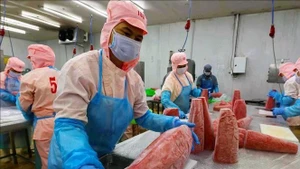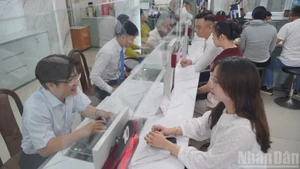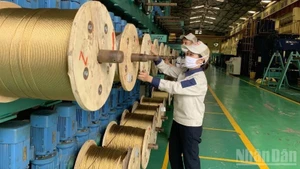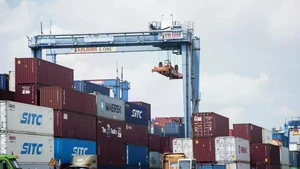Early this week, Chairman of the National Assembly (NA) Vuong Dinh Hue required that the government make new timely solutions to support people and enterprises struggling against prolonged difficulties.
“In the first quarter of this year, the country’s economic growth hit a lower-than-expected level of only 3.32% year-on-year. Several localities suffered from year-on-year low or below-zero growth. Meanwhile, the total export-import turnover in many key industrial sectors either dropped or increased at a low level,” Chairman Hue stressed.
He also suggested that solutions must be taken to punish those who are irresponsible in carrying out their assigned tasks, which have undermined the country’s efforts to assist people and businesses and to achieve the desired economic growth of 6.5%, this year.
The economy grew by 3.32% year-on-year in the first quarter of the year, making it difficult to deploy other targets. The Ministry of Planning and Investment has calculated that to hit the targeted 6.5% growth rate this year, the economy must grow 6.7 in the second quarter, 7.5% in the third quarter, and 7.9% in the fourth quarter. The growth rates for the latter half of the year must be 1 and 0.8 % higher than the third and fourth growth scenarios, set early this year (6.5 and 7.1%, respectively).
This would also mean that the growth speed for the third and fourth quarters must be 2.26 and 2.38 times higher than the 3.32% growth rate in the first three months.
“Many businesses have been bogged down with difficulties, and some have been forced to shrink or stop operations. The macroeconomy boasts many risks while there is great pressure in high exchange rates, interest rates, and non-performing loans,” Chairman Hue stated.
In a specific case, over the past four months, Nguyen Hai Hoa, a 33-year-old worker from a Japanese company, manufacturing plastics and electronics products at Hanoi’s Thang Long Industrial Park, has been working in moderation.
“The company doesn’t want to apply a cutback of employees and instead it has reduced the official working time per worker from an average of eight to six hours. We are also not allowed to continue working two hours of overtime a day as before,” Hoa said.
This company, which began operations in Vietnam eight years ago, is using more than 1,000 workers, half of whom have suffered from the new policy induced by a reduction in export orders from Japan and the US.
According to the General Statistics Office (GSO), Vietnam’s index for industrial production (IIP) in April increased by 0.5% compared to last year, when the IIP rose 10.7% year-on-year. However, the poor performance of many businesses has caused a year-on-year 1.8% drop in the first four months of this year. In the same period of last year, the rate increased by 7.8% year-on-year.
“This is because the world economy is recovering slowly and many countries have been applying their tightened monetary policy. All of these have resulted in a plummet in consumption demands of Vietnam’s main trade partners, and this has led to a decrease in production orders and export turnover,” the GSO stressed.
Also, in the first four months of this year, the mining sector dropped 2.8% as compared to the corresponding period last year, when it climbed 4.1% year-on-year. The processing and manufacturing sector also dropped 2.1% year-on-year, while the same period last year saw a year-on-year rise of 8.5%. The electricity production and distribution sector only grew 0.5% year-on-year, versus a 7% climb in the first four months of 2022. The reductions in these sectors have led to a big decrease in the four-month IIP. The economy grew only 3.32% year-on-year – lower than the target of at least 6.5%.
The IIP of many key sectors also narrowed down, such as the production of transportation means (9.6%); engined vehicles (8.5%); paper and paper-based products (7.9%); clothes (7.4%); furniture (6%); electronics, computers, and optical products (5.1%); and textiles (5%).
Rough figures from the General Department of Vietnam Customs, during the January-May 15 period, Vietnam’s total export-import turnover is estimated to hit 230.59 billion USD, down by 42.1 billion USD or 15.4% year-on-year.
The total export turnover reached 118.58 billion USD, down by 12.8% or 17.47 billion USD. The country’s export value from all of its key markets witnessed a big decrease, including China (7.9%), the US (22.1%), the Republic of Korea (6.9%), ASEAN (1.3%), the EU (14.1%), and Japan (0.9%).
Meanwhile, Vietnam’s total import turnover during the January-May 15 period hit 112.01 billion, down by 18% or 24.63 billion.
Notably, the total four-month export-import turnover of foreign-invested enterprises (FIEs) is estimated to hit 144.02 billion USD – down 15.1% year-on-year or 25.68 billion USD. In which, FIEs’ export turnover reached 79.1 billion USD – representing a year-on-year reduction of 11.2 billion USD or 12.4%, and their import value touched 64.92 billion USD – down by 14.49 billion USD or 18.3%, as compared to the same period last year.
Vu Hong Thanh, Chairman of the National Assembly Economic Committee, noted, “With existing difficulties in the world economy and a reduction in Vietnam’s import of production materials and FIEs’ imports, the country’s export-import outlook in the coming months will face massive difficulties, meaning negative impacts on the entire economy’s growth.”
“In this context, effectively taking advantage of already-inked free trade agreements (FTAs) is important. However, a recent number of studies of the Vietnam Chamber of Commerce and Industry (VCCI) have shown, that the Vietnamese economy and enterprises have failed to capitalise on the FTAs as desired,” Thanh said.
Specifically, under a VCCI survey, “Not knowing about FTAs’ benefits” is always one of the biggest reasons behind enterprises’ failure in benefiting from FTAs, and it only follows the reason of “Having no real transaction with FTA partners”.
“Production and business activities are facing enormous difficulties, especially in the sectors of industry and construction, and small- and medium-sized enterprises,” Deputy Prime Minister Le Minh Khai told the NA on May 22. “The total number of newly-registered enterprises and enterprises resuming operations has decreased, while the number of those with halted operations and dissolution has risen.”
The government reported that in the first four months of 2023, there were about 49,900 newly-established businesses registered at around 20.2 billion USD and employing as many as 331,400 labourers – up only 0.6% in the number of enterprises but down 26.8% in registered capital, and 4.8% in the number of employees as compared to those in the same period last year.
If an additional 26.28 billion USD registered by the nearly operational 17,200 enterprises is taken into account, the total newly-registered capital inserted into the economy in the first four months sat at 46.48 billion USD, down 46% year-on-year.
Also in this period, the number of businesses with halted operations reached nearly 50,000, up 21.8% year-on-year. Also, nearly 21,000 enterprises stopped operations and waited for completing dissolution procedures – up nearly 40%. Some 6,100 businesses completed such procedures – up 10.1%. On average, each month saw 19,200 enterprises being kicked out of the market.
PM Chinh has ordered new measures from ministries, agencies, and localities to support people and enterprises to get out of difficulties and boost production and business activities so that the economy can reach its set target of 6.5% this year.
















